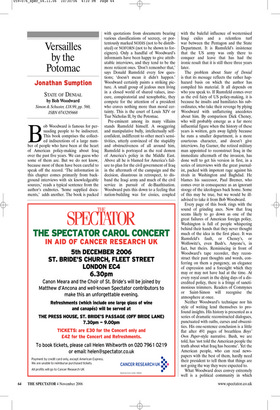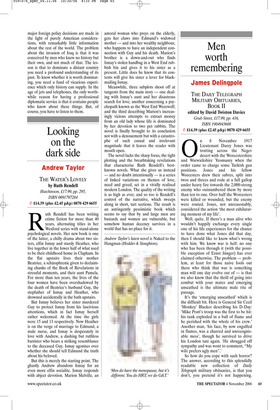Versailles by the Potomac
Jonathan Sumption
STATE OF DENIAL by Bob Woodward Simon & Schuster, £18.99, pp. 560, ISBN 0743295668 Bob Woodward is famous for persuading people to be indiscreet. This book comprises the collected indiscretions of a large number of people who have been at the heart of American policy-making about Iraq over the past five years. We can guess who some of them are. But we do not know, because most of them have been careful to speak off the record. ‘The information in this chapter comes primarily from background interviews with six knowledgeable sources,’ reads a typical sentence from the author’s endnotes. ‘Some supplied documents,’ adds another. The book is packed with quotations from documents bearing various classifications of secrecy, or portentously marked NODIS (not to be distributed) or NOFORN (not to be shown to foreigners). Only a handful of Woodward’s informants have been happy to give attributable interviews, and they tend to be the more reticent ones. ‘Don’t remember that,’ says Donald Rumsfeld every few questions; ‘doesn’t mean it didn’t happen.’ Woodward certainly paints a striking picture. A small group of jealous men living in a closed world of shared values, insecure, conspiratorial and xenophobic, they compete for the attention of a president who craves nothing more than moral certainty. This is the court of Louis XIV or Tsar Nicholas II, by the Potomac.
Pre-eminent among its many villains stands Rumsfeld himself. A swaggering and manipulative bully, intellectually selfconfident, indifferent to other men’s sensitivities, utterly convinced of the stupidity and obstructiveness of all around him, Rumsfeld is portrayed as the real demon of America’s policy in the Middle East. Above all he is blamed for America’s failure to plan for the civil government of Iraq in the aftermath of the campaign and the decision, disastrous in retrospect, to disband the Iraqi army and much of the civil service in pursuit of de-Baathisation. Woodward puts this down to a feeling that nation-building was for cissies, coupled with the baleful influence of westernised Iraqi exiles and a relentless turf war between the Pentagon and the State Department. It is Rumsfeld’s insistence that the US army was only there to conquer and leave that has had the ironic result that it is still there three years later.
The problem about State of Denial is that its message reflects the rather haphazard basis on which the author has compiled his material. It all depends on who you speak to. If Rumsfeld comes over as the evil fairy of US policy-making, it is because he insults and humiliates his subordinates, who take their revenge by plying Woodward with unflattering anecdotes about him. By comparison Dick Cheney, who will probably emerge as a far more influential figure when the history of these years is written, gets away lightly because he runs a smaller department, is a more courteous character, and doesn’t give interviews. Jay Garner, the retired military man appointed to reconstruct Iraq in the immediate aftermath of the invasion, has done well to get his version in first, in a series of interviews with the great journalist, packed with impotent rage against his rivals in Washington and Baghdad. He blames his successor, Paul Bremer, who comes over in consequence as an ignorant stooge of the ideologues back home. Some of this may be true, but we would be illadvised to take it from Bob Woodward.
Every page of this book rings with the sound of grinding axes. Now that Iraq seems likely to go down as one of the great failures of American foreign policy, Washington is full of people whispering behind their hands that they never thought much of the idea in the first place. It was Rumsfeld’s fault, or Cheney’s, or Wolfowitz’s, even Bush’s. Anyone’s, in fact, but theirs. Reminiscing in front of Woodward’s tape recorder, they reconstruct their past thoughts and words, conferring on them a pungency, an elegance of expression and a foresight which they may or may not have had at the time. At every royal court in the dying days of a discredited policy, there is a fringe of sanctimonious trimmers. Readers of Commynes or Saint-Simon will recognise the atmosphere at once.
Neither Woodward’s technique nor his style of writing lend themselves to profound insights. His history is presented as a series of dramatic reconstructed dialogues, punctuated with oaths, curses and obscenities. His one-sentence conclusion is a little flat after 491 pages of breathless Boys’ Own Paper-style narrative. Bush, we are told, has ‘not told the American people the truth about what Iraq has become’. Yet the American people, who can read newspapers with the best of them, hardly need their president to tell them that things are not going the way they were expected to.
What Woodward does convey extremely well is a political community in which major foreign policy decisions are made in the light of purely American considerations, with remarkably little information about the rest of the world. The problem about the invasion of Iraq is that it was conceived by men who knew no history but their own, and not much of that. The lesson is that to dominate a distant country you need a profound understanding of its past. To know whether it is worth dominating, you need a fund of vicarious experience which only history can supply. In the age of jets and telephones, the only worthwhile reason for having a professional diplomatic service is that it contains people who know about these things. But, of course, you have to listen to them.



















































































































 Previous page
Previous page